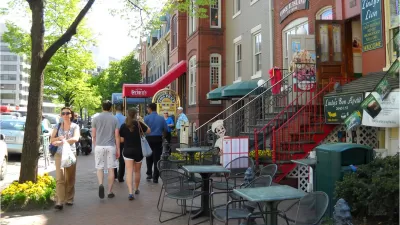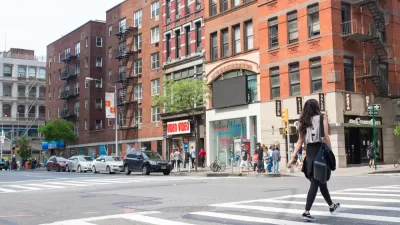Though many retirement communities still look just as they have for many decades—defined by cul-de-sacs and golf courses—many seniors are looking for a more urban lifestyle.

"In the age of the Fitbit and a growing cohort of active, engaged retirees eager to take their daily 10,000 steps, retirement communities have been slow to change," according to an article by John W. Wasik.
Despite 80 percent of retirees still living in car-dependent suburbs and rural areas, a new paradigm is emerging for retirement lifestyles: walkable, urban space. According to Wasik, a walkable, urban space "may range from existing neighborhoods in places like Brooklyn or San Francisco to newly built housing within city and suburban cores from coast to coast."
"Walkability, though, is much more than a hip marketing pitch. It’s linked to better health, social engagement and higher property values," according to Waski.
The article cites the expertise of Christopher Leinberger, who has been a leading researcher on the topic of walkable urban places, including the "Foot Traffic Ahead 2016" report, which finds growing demand for the development pattern
There are many obstacles to the creation or preservation of walkable urban places, especially as designed to cater to seniors and retirees. "Age-friendly communities within cities may require extensive infrastructure improvements, including wider sidewalks, bike lanes, more public transportation options and longer pedestrian signal walk times," reports Waski.
FULL STORY: The Future of Retirement Communities: Walkable and Urban

Maui's Vacation Rental Debate Turns Ugly
Verbal attacks, misinformation campaigns and fistfights plague a high-stakes debate to convert thousands of vacation rentals into long-term housing.

Planetizen Federal Action Tracker
A weekly monitor of how Trump’s orders and actions are impacting planners and planning in America.

In Urban Planning, AI Prompting Could be the New Design Thinking
Creativity has long been key to great urban design. What if we see AI as our new creative partner?

King County Supportive Housing Program Offers Hope for Unhoused Residents
The county is taking a ‘Housing First’ approach that prioritizes getting people into housing, then offering wraparound supportive services.

Researchers Use AI to Get Clearer Picture of US Housing
Analysts are using artificial intelligence to supercharge their research by allowing them to comb through data faster. Though these AI tools can be error prone, they save time and housing researchers are optimistic about the future.

Making Shared Micromobility More Inclusive
Cities and shared mobility system operators can do more to include people with disabilities in planning and operations, per a new report.
Urban Design for Planners 1: Software Tools
This six-course series explores essential urban design concepts using open source software and equips planners with the tools they need to participate fully in the urban design process.
Planning for Universal Design
Learn the tools for implementing Universal Design in planning regulations.
planning NEXT
Appalachian Highlands Housing Partners
Mpact (founded as Rail~Volution)
City of Camden Redevelopment Agency
City of Astoria
City of Portland
City of Laramie





























